Why Trump's Tariff's Could Spark More Media Buying By Machines
Goodway CEO Jay Friedman on why AI might help steer brands through a potential downturn
COVID-19 was credited with ‘accelerating’ many trends that would have happened eventually. For consumers, that was way more streaming and eCommerce; for brands it was faster planning and more spending on data-driven/addressable ads.
What might the Trump Tariff Meltdown accelerate? Could it be AI? Or AI as an excuse to cut the hell out of things?
Nobody knows what’s going to happen with tariffs, the stock market, consumer confidence, or ad spending. I hope this all blows over - but things ain’t looking so good.
Maximize your YouTube advertising with VuePlanner. As a member of the YouTube Measurement Program for Brand Suitability and Contextual Targeting, VuePlanner enables you to buy with confidence, clarity, and precision. Using advanced technology and AI-powered optimization, VuePlanner offers custom-curated contextual collections, exclusive content strategies, and transparent reporting for measurable, impactful results. Take control of your campaign performance—partner with VuePlanner now.
While it took brands a moment to catch their breath during the 2008 Great Recession (before cutting a lot), the industry moved very quickly in 2020, first to cut, and then to come back.
It seems maybe that newly learned nimbleness is giving marketers confidence that they can shift gears on a dime. We’ll see what happens over the next few weeks (what a time to hold an upfront! “Hey, let’s make a bunch of long spending commitments.”) But in the meantime, I had Goodway Group CEO Jay Friedman on the Next in Media podcast this week to take the temperature of the market, as well as his reaction to the various Google trials and other industry hot buttons.
“So there's not cutting yet,” Friedman said. “There's definitely scenario planning.”
That jibes with what Smartly CEO Laura Desmond told Peter Kakfka’s Business Insider in his podcast this week. “The next four to six weeks will be a big decision point. Because if there's no product on the shelves, then that's gonna change anybody's advertising campaign.”
If there is cutting, Friedman told me, “I think it will be blunt and arbitrary.”
That’s usually the case, which is why you’re seeing surveys predicting that stuff like gaming and linear TV will get cut, and retail media may win, if we indeed head into a downturn. Humans, even CFOs, are reactive and emotional, Friedman noted.
But, Friedman noted, AI should help brands and media companies be a lot smarter this time around. “I think one of the biggest benefits of AI will be de-biasing decision making,” he said. He suggested feeding ad forecast models, the history of economic cycles, all of Ray Dalio's books and even data from the 1930 Smoot-Hawley Tariff to help figure out how consumers are likely to react, and what kind of budget decisions make the most sense. “We can load all that up and start asking questions rather than trying to make an assumption and basing hundred million dollar decisions off of it,” he said.
That’s short term. I wonder if this moment of potential crisis accelerates what was already on the docket - the AI-ization of media buying, planning and optimization. What better excuse for big agencies and brands to push further and faster into using smarter tools, and streamlined operations?
Friedman said it may depend on the size of the agency and or brand involved. Big holding companies “are not going to lose all of the major brands overnight because they haven't transformed fast enough,” he said. “And so there is a really important change management component of this.”
Yes and no. I could see this period as providing, a great excuse for justifying a ton of job cuts and consolidation (I’m not rooting for this by the way). But I could certainly see a lot of big holding companies using a rocky economy as an opening to start cutting media agency staff and jumping right in to more AI-oriented buying tools - or funneling more dollars to AI tools run by the Metas and Googles of the world.
Right, but what about the upfronts and NewFronts, which are right in front of us, and big spending decisions seemingly can’t be put off?
“If I am a really large advertiser right now, I believe I'm holding the chips,” said Friedman. “And I'm holding the chips because if I normally commit X hundreds of millions of dollars to this publisher for upfront or even 50 million or whatever it is, I think that can wait.”
Here are a few more interesting takes from Friedman:
On whether a Google ad tech break up will have a big impact: “It is the back channeling of data…that Google has between Android and Maps and YouTube and Search and Display and GAM and everything else that makes it so unstoppable. I feel like they have four trains running down the track. And even if two of them get taken out, they've still got two with a whole lot of diamond.”
On whether AI search is bad for the open web: “Let's say there are a million and 40,000 websites. That means there are probably a million more websites than we really need. One of the smarter guys and I've never met the industry said to me, you know, if you're looking for a chicken parm recipe, it's really hard to create a site that has an advantage. So most publishers out there don't serve a niche.”
On why fraud and all sorts of other digital ad shenanigans persists, despite all the negative reports that continue to come out: “I do think people are willfully and intentionally looking the other way and, and, really mis-charging people and misrepresenting their products. It's challenging when you have companies who are worth billions or trillions that are willfully out there and obfuscating information that would help them make a good decision.”





